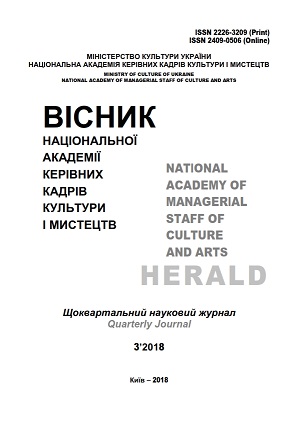Improved Folk Instruments as a Factor of Holistic System of Academic Musical and Instrumental Culture of Our Time
Improved Folk Instruments as a Factor of Holistic System of Academic Musical and Instrumental Culture of Our Time
Author(s): Alla Dmitrivna ChernoivanenkoSubject(s): Customs / Folklore, Music, Higher Education , Sociology of Culture, Sociology of Art
Published by: Національна академія керівних кадрів культури і мистецтв
Keywords: musical instrument; improved folk instruments; academic musical and instrumental culture; academic music;
Summary/Abstract: The purpose of the work is to determine the logic of the musical-historical process of academization of the improved bayan/accordion, domra, balalaika, and bandura of the second half of the 20th - the beginning of the 21st centuries. The methodology of the study involves the use of aesthetic-cultural, comparative, theoretical and historical methods, as well as the analytical approach, which form a unified methodological basis. Along with the complex method, a socalled system approach is needed, which allows the object to be comprehensively studied at the most diverse, but interrelated levels. The scientific novelty of the work appears in the expansion of ideas about the genesis and functioning of academic musical and instrumental art as a holistic artistic, culturological and musical phenomenon, taking into account the key role of performing forms of being in the present and the need to update the instrumental-sound phono-sphere of modernity, which is immanently consistent with socio-historical , performing and timbre-textual properties of the advanced folk instruments of our country. Conclusions. The logic of the musical-historical process of academization of bayan/accordion, domra, balalaika and bandura reveals the socio-historical, artistic-aesthetic, instrumental-performing and culturological prerequisites of the phenomenon, among which the author specifically highlights the demand for "fresh" instruments by the very composer's creativity in change of its paradigms in favor of the emancipation of sound; immanent readiness of the "musicians playing folk instruments" to improvise-experimental acts of "sound search"; perspective for the academic phono-sphere of the "ultimate" chamber nature of plucking instruments.
Journal: Вісник Національної академії керівних кадрів культури і мистецтв
- Issue Year: 2018
- Issue No: 3
- Page Range: 370-376
- Page Count: 7
- Language: English

